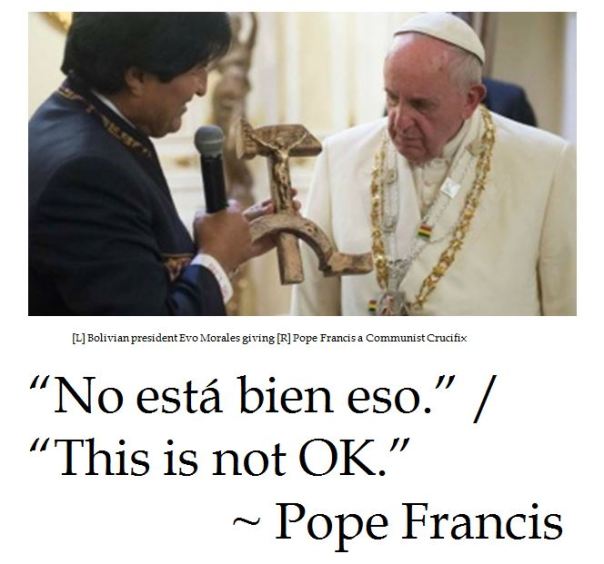On the second leg of his trip to South America, Pope Francis traveled to Bolivia. The Holy Father made a courtesy visit to Eso Morales at the Palace of the Government in La Paz. Pope Francis only made a short four hours visit in La Paz as the 4,000 meter altitude was difficult for him to breath as he has only one lung.
As is customary when heads of state meet, the President and the Pope exchanged gifts. Pope Francis gave the Bolivian president a mosaic of the Marian icon of the “Salus Populus Romani". For his part, Bolivian President Eso Morales gave the Holy See a crucifix based on a hammer and sickle, essentially a communist crucifix. This was not the only politically charged gift. Morales also gave Pope Francis "The Book of the Sea" a tome bemoaning Bolivia's loss of access to the sea in the 1879-93 War of the Pacific.
As for the gift of religious art, Pope Francis shook his head as the Socialist President gave him this communist styled crucifix and audibly said: “No está bien eso”. As this exchange was filmed for transmission throughout the world, the Holy Father's embarrassment seemed visible.
 Aside from his Socialist politics, Eso Morales gift had some symbolism associated with Catholicism, as this hammer and sickle crucifix was modeled after one carved by Jesuit missionary Fr. Luis Espinal Camps, S.J.. Espinal Camps was abducted by the paramilitaries loyal to the Bolivian dictatorship, tortured for five hour and shot 17 times in 1980.
Aside from his Socialist politics, Eso Morales gift had some symbolism associated with Catholicism, as this hammer and sickle crucifix was modeled after one carved by Jesuit missionary Fr. Luis Espinal Camps, S.J.. Espinal Camps was abducted by the paramilitaries loyal to the Bolivian dictatorship, tortured for five hour and shot 17 times in 1980.
Shortly after arriving in Bolivia Pope Francis' motorcade stopped along the highway where Fr. Espinal Camps was abducted. Pope Francis prayed:
"Remember one of our brothers, a victim of interests that didn't want him to fight for Bolivia's freedom,. Father Espinal preached the Gospel, the Gospel that bothered them, and because of this they got rid of him."
Vatican spokesman Fr. Federico Lombardi, tried to walk back from this diplomatic faux pas by claiming that Pope Francis was unaware that the gift was inspired by Fr. Espinal Camps crucifix and that the Holy Father meant to say: "I didn't know" instead of "This is not right". That explanation is courteously convenient but seems spurious considering the Pope's actual words and his visible embarrassment over the gift.
For all those Catholic criticasters who claim that Pope Francis' beatification of Blessed Oscar Romero was an embrace of liberation theology or that the environmental encyclical Laudato Si was a Marxist manifesto, how do they reconcile Pope Francis' exclamation: “No está bien eso”?
During his remarks to grassroots groups helping the marginalized in Santa Cruz, Bolivia, Pope Francis addressed head on the charge that he is a communist. "When I talk about this [Land, Lodging and Labor], some people think the pope is a communist, They don't realize that love for the poor is at the
center of the Gospel."
No doubt that Pope Francis believes in a evangelical option for the poor, as do many contemporary Jesuits and that he walks the talk on social justice. But if Pope Francis were the Red Pope, why would he recoil at a communist crucifix?
Perhaps the Bolivian visit highlights the conundrum of Pope Francis' disposition towards social justice. Austral University Historian Roberto Bosca noted that Jorge Bergolio (later Pope Francis) opposed liberation theology during the 1970s, but that he accepted the premise of liberation theology (especially the preferential option for the poor) done in a non-ideological fashion. But as the rhetoric meets reality, as demonstrated by Eso Morales photo op, secular socialists (and communists) may strive to exploit this sympathy for their own atheistic advantage.


No comments:
Post a Comment